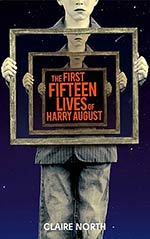
![]() Bormgans
Bormgans
11/11/2025
![]()
Credit were credit is due: North had an excellent idea and ran with it. She maximizes 'Groundhog Day' to 'Groundhog Lives', and adds thriller and spy elements. Harry August is an Ouroboran, or a Kalachakra, and when he dies, he is reborn again, in the same place in Northumberland, on the same day in 1919, but with all the memories of his previous lives intact.
North writes good scenes, her pacing is excellent and she uses structure well. I was gripped from the start. But somewhere around page 200 -- that's about 50% in -- I started to get annoyed. At page 250 I was actively toying with the idea of abandoning the book, but as it remained a smooth read, I pushed through, but now in a mild hate read mode.
I can see why people like this. It's fun entertainment. It's a puzzly beach read. But Claire North shows no firm grasp on truth or wisdom or humanity or reality in 'The First Fifteen Lives of Harry August'.
What bothered me?
1) North completely sidesteps the mind-body problem. Not that she's not aware it exists, but she doesn't seem to care, nor offers a coherent treatment of said problem in the book. She tries with handwavium: "the mind is what takes the journey through time while the flesh decays. We are no more and no less than minds". A couple of pages later North muddles that clarity with "a certain biological incentives drives us, regardless of the ages of our mind."
As babies, it seems that reborn minds need to wait for enough biological ripening of the brain to fully become aware of their previous lives, yet by the age of 6 everything seems in order and they have regained full conscious, adult capacity. So the flesh of the brain does play a part, but not really?
At the same time, North does offer the possibility of forgetting: via surgery, chemistry or electrical stimulation, most Ouroborans' minds can be erased -- that is, their memories, but not their personalities. And some other (biological) trick can destroy their outright existence -- their "souls"?
In his twelfth life, age six, Harry describes physically remembering the trauma of being tortured, and wonders "why my body refused to forget a thing which my mind had long since passed on by." That seems like having the cake and eat it. Make up your mind, North: as trauma has physical effects on the body, and if the mind can pass those by, how come another body feels it in another life?
There are other examples, but I'll leave it at that.
2) At certain points in the novel, Harry, as a "mind", is over 800 years old. I'm closer to 50 than to 40 when I'm writing this. If I consider what I have learned just the last decade of my life, I have to say Harry is a very, very superficial dude, even at 600 or 800. The character radiates no wisdom at all, doesn't have a single drop of insight in the nature of life or reality or consciousness or ethics or love or whatever it is that makes life worth living. Not that he's a nihilist, even though he claims that he is convinced "of the truth of nothingness" after he spend a full life searching for answers and meaning in religions around the globe. That seemingly deep thought about "nothingness" is never explored in the book, nor does Harry's actions convey his conviction. At 28, Claire North probably had enough chops to construct a clever plot, but she seems to have lacked the wits to write a believable character that should be way more wise than he acts. Harry does drown a 15-year old boy though, in the blink of an eye, and considers to kill an innocent orphan too. Not sure how he feels about all that. North doesn't explain.
3) Tons and tons of handwavium. Harry learns lots, becomes one of the best quantum physicists on the planet, a megamaxipolyglot, manages to build a transnational company, learns forgery to an uncanny degree, etc. During the spy/thriller part of the book, he has no trouble traveling the globe, tapping contacts, reading people in an instant and get things done better than James Bond. North pulls out "but he has ages of experience" as a justification time and time again, but it simply doesn't add up. She makes Harry do stuff that writers like Le Carré have shown to take tedious effort and time, even for those that are very experienced. North just glosses over all of it, again and again.
4-8) ...
Full review on Weighing A Pig
https://schicksalgemeinschaft.wordpress.com/2025/11/10/the-first-fifteen-lives-of-harry-august-clair